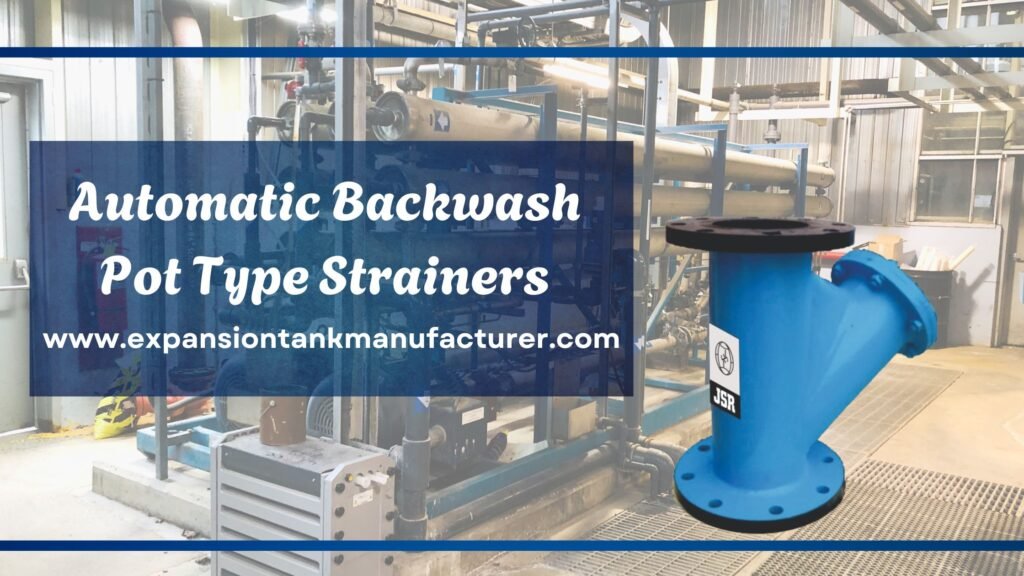Delhi, the capital city of India, is a bustling metropolis facing many challenges regarding water management and treatment. As the city grows rapidly with the population and increased industrial demands, the need for clean and safe water for both residential and commercial purposes has been of utmost importance. Among the most effective methods of maintaining water quality is through the use of automatic backwash pot-type strainers, which are critical components in water treatment systems.
We shall examine the operation of a JSR automatic backwash pot-type strainer Manufacturer in Delhi, how it fits into water treatment processes in Delhi, and the way it plays a crucial role in ensuring the efficiency and sustainability of purification systems. With this central technology, we are hoping to be able to explain to business houses, municipalities, and industries alike how automatic backwash pot-type strainers could help in water treatment operations.
What are Automatic Backwash Pot-Type Strainers?
Automatic backwash pot-type strainers are specialized filtration devices used in a variety of industrial and municipal applications to remove debris, particles, and impurities from water. The term “pot-type” refers to the compact cylindrical shape in which the strainer contains the filtration element. These strainers are designed to work automatically to be continuously cleaned by the backwash process, thus eliminating manual maintenance and saving more time and labor costs.
The backwash procedure is the procedure in which water flow through the strainer is reversed to flush out any materials that have built up. Filtrated water continues to run into the system, while the waste is washed out, hence ensuring that the strainer stays clean and works efficiently without intervention.
Why are Automatic Backwash Pot-Type Strainers Important for Water Treatment in Delhi?
Delhi is a city where heavy industrialization, agricultural activity, and dense population all put pressure on its water resources. The treatment of water is essential to ensure access to clean water, protect public health, and fulfill industrial demands. In this respect, automatic backwash pot-type strainers are important for the following reasons:
1. Efficient Filtration for Cleaner Water
With the rapid urbanization of Delhi, industrial and municipal water treatment plants need to treat a large volume of water, which usually contains significant debris, sand, rust, and other particulate matter. Such particles can damage sensitive equipment such as pumps, valves, and pipelines or degrade the quality of water distributed to consumers.
Automatic backwash pot-type strainers offer an efficient filtration solution by removing large particles, dirt, and debris from the water. By preventing these contaminants from entering the water supply, these strainers help improve water quality and protect downstream equipment. They are especially crucial in areas like Okhla, Connaught Place, and Dwarka, where water systems serve dense populations and industrial areas.
2. Reduced Maintenance Costs and Time
In traditional filtration systems, the accumulated debris has to be removed through manual cleaning and maintenance. This process is usually time-consuming, labor-intensive, and costly. However, with automatic backwash pot-type strainers, the need for manual cleaning is reduced significantly.
Once the strainer has detected a certain level of dirt accumulation, it automatically initiates a backwash cycle to flush out the debris. This self-cleaning process ensures continuous operation and reduces the need for frequent manual interventions. For industrial water treatment plants and municipal systems in Delhi, this translates to cost savings and increased operational efficiency.
3. Improved Water Flow and System Longevity
The accumulation of debris and particles in water treatment systems can cause clogging, reduce flow rates, and result in pressure drops. This affects the overall performance of the system and can cause damage to pumps and other equipment.
JSR Automatic backwash pot-type strainers Manufacturer in India prevent such issues by maintaining the filtration process at optimal performance. Constant self-cleaning maintains consistent water flow through these strainers, thus enhancing the efficiency of water treatment plants. For Delhi, this means systems that last longer and have fewer operational disruptions.
4. Compliance with Water Quality Standards
Delhi has strict regulations about water quality and safety. The government has very strict guidelines for municipal water treatment. Water treatment facilities are required to remove various impurities from water to meet BIS and WHO standards.
Strainers automatically set and follow the backwash pot type, thus effectively getting rid of contaminants and ensuring overall water quality, which helps achieve compliance with water quality standards. Automatic cleaning ensures continuous reliable filtration and thus facilitates the attainment of targets set by regulations for water treatment plants at Delhi.
5. Sustainability and Reduced Environmental Impact
In a city like Delhi, where water scarcity is an increasing issue, efficient water treatment systems that reduce waste and energy consumption are critical. Automatic backwash pot-type strainers contribute to sustainability by using minimal water for the backwash process. The backwashing cycle is designed to use just enough water to clean the strainer, thus there is no significant waste of treated water.
Self-cleaning strainers incorporated in water treatment systems will ensure sustainable water management with high-quality filtration in Delhi.
Key Features of Automatic Backwash Pot-Type Strainers
The following are the features of automatic backwash pot-type strainers, which make them an ideal choice for water treatment systems in Delhi:
1. Automatic Operation: The strainer cleans itself without any manual intervention and ensures the continuity of the filtration process without interruption.
2. Durability: Pot-type strainers are designed to withstand harsh environments, making them ideal for Delhi’s industrial settings or municipal water treatment plants.
3. Easy Integration: These strainers can be easily integrated into existing water treatment systems, making them a cost-effective upgrade for facilities that want to improve their filtration capacity.
4. Versatility: Automatic backwash pot-type strainers are versatile in flow rates and filtration needs, and they can be used for all types of applications, from residential to industrial water treatment.
5. Low Energy Consumption: The energy consumption during backwash is low, making the strainers environmentally friendly and cheap in the long run.
Applications of Automatic Backwash Pot-Type Strainers in Delhi
Automatic backwash pot-type strainers are applied in different applications in the water treatment system in Delhi.
- Municipal Water Treatment Plants: Ensuring clean and potable water for the city’s population.
- Industrial Water Treatment: Protecting equipment and improving the efficiency of water used in manufacturing processes.
- Desalination Plants: Removing particles and debris from seawater or brackish water before it undergoes desalination.
- Cooling Water Systems: Ensuring the cleanliness of water used in cooling processes in power plants and factories.
- Irrigation Systems: Protects debris from obstructing irrigation lines and improves water distribution efficiency in agricultural projects.
Conclusion
As the need for clean water in Delhi increases day by day, the importance of efficient and reliable water treatment systems is much needed. Automatic backwash pot-type strainers serve as a viable, cost-effective, and efficient means to meet the challenges of debris and contaminants in water.
With the investment in these strainers, water treatment facilities in Delhi can improve filtration efficiency, reduce maintenance costs, improve system performance, and ensure compliance with water quality standards. Automatic backwash pot-type strainers are an essential tool in achieving clean and safe water in Delhi, whether for municipal water supply, industrial applications, or commercial use.
FAQs
1. How does an automatic backwash pot-type strainer work?
An automatic backwash pot-type strainer works by trapping debris and particles in the strainer element. When a certain level of buildup is detected, the system automatically initiates a backwash cycle to flush out the contaminants, ensuring uninterrupted filtration.
2. Can automatic backwash pot-type strainers be used for large-scale industrial applications?
Yes, these strainers are designed to handle large flow rates and can be used in both industrial and municipal water treatment systems in Delhi.
3. What are the benefits of automatic backwash over manual cleaning?
Automatic backwashing eliminates the need for manual intervention, reducing labor costs and downtime. The self-cleaning feature also ensures continuous operation, improving system efficiency.
4. How do automatic backwash pot-type strainers contribute to environmental sustainability?
These strainers use minimal water for the backwash cycle, reducing water wastage and energy consumption, which makes them an environmentally friendly choice for water treatment plants in Delhi.
5. Where can I install an automatic backwash pot-type strainer in Delhi?
These strainers are versatile and can be installed in municipal water treatment plants, industrial water filtration systems, and cooling water systems across Delhi’s urban and industrial areas.




